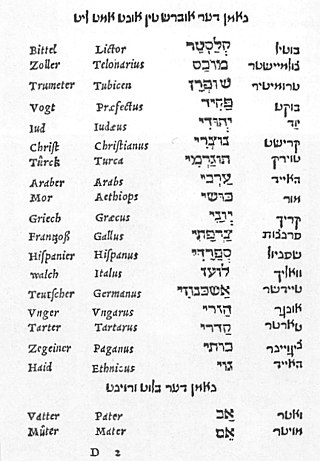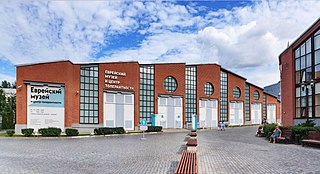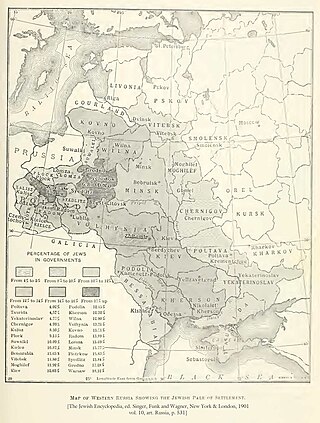Related Research Articles
Antisemitism is hostility to, prejudice towards, or discrimination against Jews. This sentiment is a form of racism, and a person who harbours it is called an antisemite. Though antisemitism is overwhelmingly perpetrated by non-Jews, it may occasionally be perpetrated by Jews in a phenomenon known as auto-antisemitism. Primarily, antisemitic tendencies may be motivated by negative sentiment towards Jews as a people or by negative sentiment towards Jews with regard to Judaism. In the former case, usually presented as racial antisemitism, a person's hostility is driven by the belief that Jews constitute a distinct race with inherent traits or characteristics that are repulsive or inferior to the preferred traits or characteristics within that person's society. In the latter case, known as religious antisemitism, a person's hostility is driven by their religion's perception of Jews and Judaism, typically encompassing doctrines of supersession that expect or demand Jews to turn away from Judaism and submit to the religion presenting itself as Judaism's successor faith — this is a common theme within the other Abrahamic religions. The development of racial and religious antisemitism has historically been encouraged by anti-Judaism, though the concept itself is distinct from antisemitism.

Racial segregation is the separation of people into racial or other ethnic groups in daily life. Segregation can involve the spatial separation of the races, and mandatory use of different institutions, such as schools and hospitals by people of different races. Specifically, it may be applied to activities such as eating in restaurants, drinking from water fountains, using public toilets, attending schools, going to films, riding buses, renting or purchasing homes or renting hotel rooms. In addition, segregation often allows close contact between members of different racial or ethnic groups in hierarchical situations, such as allowing a person of one race to work as a servant for a member of another race. Racial segregation has generally been outlawed worldwide.

In modern Hebrew and Yiddish goy is a term for a gentile, a non-Jew. Through Yiddish, the word has been adopted into English also to mean "gentile", sometimes in a pejorative sense. As a word principally used by Jews to describe non-Jews, it is a term for the ethnic out-group.

Ashkenazi Jews, also known as Ashkenazic Jews or Ashkenazim, are a Jewish diaspora population who formed in the Holy Roman Empire around the end of the first millennium CE. Their traditional diaspora language is Yiddish, which developed during the Middle Ages after they had moved from Germany and France into Northern Europe and Eastern Europe. For centuries, Ashkenazim in Europe used Hebrew only as a literary and sacred language until the revival of Hebrew as a common language in 20th-century Israel. Throughout their numerous centuries living in Europe, Ashkenazim have made many important contributions to its philosophy, scholarship, literature, art, music, and science.

The history of the Jews in Russia and areas historically connected with it goes back at least 1,500 years. Jews in Russia have historically constituted a large religious and ethnic diaspora; the Russian Empire at one time hosted the largest population of Jews in the world. Within these territories, the primarily Ashkenazi Jewish communities of many different areas flourished and developed many of modern Judaism's most distinctive theological and cultural traditions, while also facing periods of antisemitic discriminatory policies and persecution, including violent pogroms. Some have described a "renaissance" in the Jewish community inside Russia since the beginning of the 21st century; however, the Russian Jewish population has experienced precipitous decline since the dissolution of the USSR which continues to this day, although it is still among the largest in Europe.

The Pale of Settlement was a western region of the Russian Empire with varying borders that existed from 1791 to 1917 in which permanent residency by Jews was allowed and beyond which Jewish residency, permanent or temporary, was mostly forbidden. Most Jews were still excluded from residency in a number of cities within the Pale as well. A few Jews were allowed to live outside the area, including those with university education, the ennobled, members of the most affluent of the merchant guilds and particular artisans, some military personnel and some services associated with them, including their families, and sometimes their servants. The archaic English term pale is derived from the Latin word palus, a stake, extended to mean the area enclosed by a fence or boundary.
Jew Watch was an antisemitic website promoting Holocaust denial and negative claims about Jews. The claims included allegations of a conspiracy that Jews control the media and banking, as well as accusations of Jewish involvement in terrorist groups. The site contained propaganda, according to Sam Varghese of The Age, similar to that used in Nazi Germany. It was widely considered a hate site. Jew Watch received support from Stormfront, a white nationalist and neo-Nazi site. The site described itself as a "not-for-profit library for private study, scholarship, or research [that keeps] a close watch on Jewish Communities and organizations worldwide".

The American Jewish Committee (AJC) is a Jewish advocacy group established on November 11, 1906. It is one of the oldest Jewish advocacy organizations and, according to The New York Times, is "widely regarded as the dean of American Jewish organizations". As of 2009, AJC envisions itself as the "Global Center for Jewish and Israel Advocacy".

Temporary regulations regarding the Jews were proposed by the minister of internal affairs Nikolay Pavlovich Ignatyev and enacted on 15 May, 1882, by Tsar Alexander III of Russia. Originally, regulations of May 1882 were intended only as temporary measures until a future revision of the laws concerning the Jews but remained in effect for more than thirty years.

Aryanization was the Nazi term for the seizure of property from Jews and its transfer to non-Jews, and the forced expulsion of Jews from economic life in Nazi Germany, Axis-aligned states, and their occupied territories. It entailed the transfer of Jewish property into "Aryan" or non-Jewish, hands.

The Nuremberg Laws were antisemitic and racist laws that were enacted in Nazi Germany on 15 September 1935, at a special meeting of the Reichstag convened during the annual Nuremberg Rally of the Nazi Party. The two laws were the Law for the Protection of German Blood and German Honour, which forbade marriages and extramarital intercourse between Jews and Germans and the employment of German females under 45 in Jewish households; and the Reich Citizenship Law, which declared that only those of German or related blood were eligible to be Reich citizens. The remainder were classed as state subjects without any citizenship rights. A supplementary decree outlining the definition of who was Jewish was passed on 14 November, and the Reich Citizenship Law officially came into force on that date. The laws were expanded on 26 November 1935 to include Romani and Black people. This supplementary decree defined Romanis as "enemies of the race-based state", the same category as Jews.

Melanie Kaye/Kantrowitz was an American essayist, poet, academic, and political activist against racism and for economic and social justice.
Antisemitism —prejudice, hatred of, or discrimination against Jews— has experienced a long history of expression since the days of ancient civilizations, with most of it having originated in the Christian and pre-Christian civilizations of Europe.

Shmuly Yanklowitz is an Orthodox rabbi. In March 2012 and March 2013, Newsweek and The Daily Beast listed Yanklowitz as one of the 50 most influential rabbis in America.

Adrienne Cooper was a Yiddish singer, musician and activist who was integral to the contemporary revival of klezmer music.
J. Shawn Landres is a social entrepreneur and independent scholar, and local civic leader, known for applied research related to charitable giving and faith-based social innovation and community development, as well as for innovation in government and civic engagement.

The Jewish left consists of Jews who identify with, or support, left-wing or left-liberal causes, consciously as Jews, either as individuals or through organizations. There is no one organization or movement which constitutes the Jewish left, however. Jews have been major forces in the history of the labor movement, the settlement house movement, the women's rights movement, anti-racist and anti-colonialist work, and anti-fascist and anti-capitalist organizations of many forms in Europe, the United States, Australia, Algeria, Iraq, Ethiopia, South Africa, and modern-day Israel. Jews have a history of involvement in anarchism, socialism, Marxism, and Western liberalism. Although the expression "on the left" covers a range of politics, many well-known figures "on the left" have been of Jews who were born into Jewish families and have various degrees of connection to Jewish communities, Jewish culture, Jewish tradition, or the Jewish religion in its many variants.
The Jewish Council for Racial Equality or HIAS+JCORE is a Jewish organization that works to provide a Jewish voice on race and asylum issues in the UK.
Ashkenormativity refers to a form of Eurocentrism within Ashkenazi Jewish culture that confers privilege on Ashkenazi Jews relative to Jews of Sephardi, Mizrahi, and other non-Ashkenazi backgrounds, as well as to the assumption that Ashkenazi culture is the default Jewish culture. Ashkenormativity often overlaps with white privilege, as most Ashkenazi Jews are white and derive ancestry from around Europe. However, the terms are not synonymous as Ashkenazi Jews of color do not benefit from white privilege. Certain non-Ashkenazi Jewish groups, such as Sephardic Jews, are white and benefit from white privilege. For example, Sephardic Jews who are Southern European and from said countries are white and thus benefit from white privilege. Sephardic Jews who are North African and from such countries, however, are not white and do not benefit from white privilege, experiencing racism. The term is most common in the United States, where most Jews are Ashkenazi. Ashkenormativity allegedly also exists in Israel, where Ashkenazi Jews experience cultural prominence despite no longer constituting a majority.

Jews for Racial and Economic Justice (JFREJ) is an American left-wing non-profit grassroots Jewish organization. JFREJ describes itself as a "movement to dismantle racism and economic exploitation" and is based in New York City. It operates both a 501(c)(3), also known as JFREJ Community and a 501(c)(4) known as JFREJ Action.
References
- ↑ "Beyond the Pale". beyondthepale.org. Retrieved 2012-11-02.
- ↑ "What JFREJ Does". Jews for Racial & Economic Justice. Retrieved 2012-11-02.